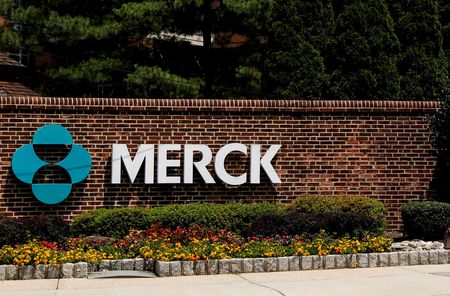By Michael Erman and Leroy Leo
(Reuters) -Merck & Co on Thursday reported higher-than-expected third-quarter sales and profit on a jump in demand for blockbuster cancer immunotherapy Keytruda and human papillomavirus vaccine Gardasil.
Merck shares were up about 2% in midday trading as the U.S. drugmaker also raised its full-year sales and profit forecast despite the impact of a weak euro and pound. The company’s shares are up over 30% year-to-date, well outperforming the broader market.
Merck has been looking to pursue deals to protect itself from an eventual revenue loss as Keytruda patents begin to expire toward the end of the decade. The company was reportedly in talks to buy cancer focused biotech Seagen Inc over the summer, but a deal did not materialize.
“Our urgency on business development has not changed. We do see a list of potential places to play,” Merck Chief Executive Robert Davis said on a conference call with analysts. “Obviously, we’ve got to bring them through to fruition, which we’re working to do.”
Chief Financial Officer Caroline Litchfield said that one difficulty in reaching deals is agreeing on valuation.
“We continue to see sellers’ expectations lag what the marketplace looks like,” she said in an interview.
Merck announced on Wednesday that Davis would take on the additional role of chairman as of Dec. 1, succeeding incumbent and former CEO Ken Frazier.
Keytruda sales jumped 20% to $5.4 billion for the quarter, in line with analysts’ estimates. Gardasil sales rose 15% to $2.3 billion, topping expectations by more than $200 million.
Gardasil’s performance “reflects growing international demand and potentially a normalization from COVID trends in the U.S.,” Wells Fargo analyst Mohit Bansal said in a note.
The company also posted slightly better-than-expected sales of its COVID-19 antiviral drug Lagevrio (molnupiravir), which it developed and shares with Ridgeback Biotherapeutics.
Merck benefited from its foreign exchange hedging program, which added roughly $300 million to quarterly revenue, partially offsetting pressure on overseas sales, CFO Litchfield said.
“Foreign exchange will continue to be a headwind,” she said, adding that the impact of Merck’s hedging program is likely to be more subtle in 2023 as the pace of the dollar’s strengthening slows.
Sales by Merck’s animal health business missed analysts’ estimates. BMO Capital Markets analyst Evan Seigerman called that “the only point of concern,” but noted the unit had enjoyed significant growth earlier in the pandemic.
Some investors have suggested Merck follow rivals Eli Lilly and Co and Pfizer Inc by spinning off its animal health business. Davis said the company has no plans to do so.
“We’re benefiting from what it brings to us and we continue to see it as a strategic asset,” the CEO said.
Merck now expects to earn $7.32 to $7.37 per share for 2022, up from its prior view of $7.25 to $7.35. It beat analysts’ estimates for adjusted profit in the quarter by 14 cents.
(Reporting by Michael Erman in New Jersey and Leroy Leo and Raghav Mahobe in Bengaluru; Editing by Edwina Gibbs and Bill Berkrot)

